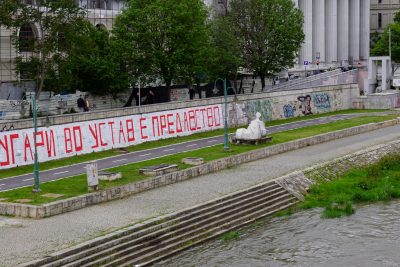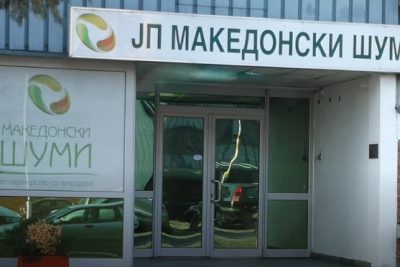Note from LeftEast editors: The Italian version of the article was originally published on the Italian left-wing website Sinistra in Europa.

On 17th and 31st October this year the first and second rounds of local elections were held in North Macedonia, a country which in recent times has seen the gradual growth of a left-wing party (Levica) that is becoming a preeminent force on the national political scene. In these elections Levica managed to achieve extraordinary results compared to four years ago when it was still an emerging movement with no notoriety. After the municipal elections in 2017 only three municipal councillors in the whole of Macedonia were from Levica, now they are 49 in total. Despite the fact that none of the party’s mayoral candidates succeeded in winning the first or enter the second rounds, the votes of the members and supporters of Levica were decisive for the victory of the electoral coalition led by the main opposition party VMRO-DPMNE which obtained 43 mayors (including that of the Macedonian capital Skopje) against the 16 of the governing party SDSM. Three days before the second round, Levica issued a statement indirectly urging its electorate to give the coup de grace to the government headed by the prime minister Zoran Zaev, responsible, according to them, for various alleged wrongdoings including: changing the name of the country against the will of the people, involvement in organised crime and extortion (as demonstrated in reports from the Italian newspaper La Verità), inefficient policies against the pandemic which turned Macedonia into the European country with the highest Covid-related death rate, and exhibiting the authoritarian tendencies of a hybrid regime (which is how democracy indexes consider the country). This decision shows a pragmatic attitude on behalf of Levica in which the ideological differences with VMRO-DPMNE, a right-wing group, were put aside in order to fight and defeat the common enemy.
Following the electoral defeat, Zaev announced his resignation from the roles of SDSM leader and Macedonia’s prime minister. So far he has relinquished the first post and will maintain the second until his party nominates a successor. The possibility that early parliamentary elections might be held in the short-term is not excluded, seeing that the government lost its majority after a party from the ruling coalition joined the opposition. Nonetheless, Levica from a minor force has become a significant political phenomenon. This is partly due to the charisma of its leader and member of the Macedonian parliament, Dimitar Apasiev, who agreed to answer some questions together with Recep ‘Haktan’ Ismail, a newly-elected member of the Skopje city council.
Which factors have facilitated the growth of Levica in recent years?
The growth of Levica was facilitated above all by its clear ideological positions with which it evaluated the ongoing political, social and economic reality in Macedonia. Another factor was the compactness of the leadership of Levica, which is composed of activists who had been working together for many years before the party’s formation, and had matured politically by observing the political conditions that the republic was experiencing. Certainly, one of the most important factors for the growth of the party is the continuous deterioration of living standards and the diminishing feeling that there is justice in the country, the loss of trust in the established political parties, and the revolt against the injustices imposed on Macedonia and the Macedonian people – all elements that Levica targets, focuses on and prioritises.

How does the political and social situation in Macedonia today compare to that when Levica was founded?
Essentially, the only differences are Macedonia’s entry into NATO and the increased vassalage of domestic political factors towards external pressure; while at a social level there is a growing sense of insecurity, injustice and hopelessness, i.e. disappointment with the status-quo. One of the most drastic changes is that in the last few years the wave of emigration of young people and professionals has intensified, which leaves the country with much less potential for initiating radical societal and social transformations.
What is the significance of the results of the local elections that were recently held?
The main significance of these local elections is the announcement of the fall of the government usurped by the ruling criminal parties SDSM (Social-democratic union of Macedonia) and DUI (Democratic Union for Integration, one of the political groups that represents the country’s Albanian minority), as well as the strengthening of the sole class-conscious and national-conscious workers’ party – Levica.
How were the recent local elections different or similar from those held previously?
There is a growing tendency to reject the idea that the main parties are the only possible choice. The entry of Levica in the municipal councils, in several places where they are in a position to dictate the majority, is a sign in this direction.
How can the newly elected Levica municipal councillors make a difference in the councils where they are present?
In the councils where the majority depends on Levica, our councillors will be able to determine their support based only on policies from our electoral programme that are in the interest of the locals, while in the rest they will be the watchful eye of the people and will be on the alert for any injustices and corrupt deals which the establishment would like to keep hidden.
At this point, is Levica willing to participate in a political government led by the other opposition parties or does it prefer an early parliamentary election?
Given our small number of members of the parliament of Macedonia (two, including Apasiev), we do not believe that with the negotiations for the formation of a new government we will be able to achieve satisfactory political practices, laws or reforms to justify our participation in an eventual new executive, so we prefer elections that would bolster our position and help us win a double-digit number of MPs.

Considering that early parliamentary elections are possible at the moment, how many MPs is Levica expecting to gain?
The electoral model in Macedonia, namely the six electoral units, as well as the different nature of the parliamentary versus local elections, which does not allow a consistent reflection of results, together with our incomplete participation in the municipal ballot (less than half of the municipalities in Macedonia had a list of Levica councillor candidates) does not facilitate an accurate prediction of the number of MPs. However, we expect the number to increase, with a tendency for the result of gained mandates to be in double digits.
What are the conditions for Levica MPs to join or support any new government?
The demands that Levica will make for possible support depend on the forces that are at its disposal (the number of MPs) and cannot be predetermined, but will mainly consist of: processing criminal cases that have been put “in a drawer” by corrupt prosecutors who are subordinate to the current executive; reforming the justice system; increasing the minimum wage; changing the electoral model in order to introduce just one electoral unit; the cessation of the undignified negotiations with neighbouring Bulgaria; the annulment of the Prespa Agreement; the closure of the landfills used for burning foreign toxic waste and greater cooperation with countries outside of NATO.
What is Levica’s stance on the Prespa Agreement and Macedonia’s name change? According to you, is there a way to reverse it?
Levica is explicitly against the name change, the imposed and treacherous Prespa Agreement (which is contrary to the will of the majority expressed in the 2018 referendum), and Macedonia’s membership of NATO. We believe that nothing is finished and eternal and that these are historically reversible processes.

What is Levica’s position on Bulgaria’s veto on the start of EU accession talks for Macedonia?
The Bulgarian veto is only the contemporary continuation of the Greater Bulgarian ambitions which have been fed for more than a century and which in the past were the cause of wars and sufferings in order to satisfy the chauvinistic ideas of the Bulgarian bourgeoisie. No country should allow itself to be subjected to blackmail in terms of its sovereignty and national identity, so in this regard the opening of accession talks with the EU means nothing if in the meantime we Macedonians become “North Macedonians”.
What is Levica’s standpoint regarding EU membership for Macedonia? Does the party support any particular alternatives?
Levica is not against Macedonia’s European integration, as long as the path towards the EU does not entail the uncompromising adoption of neoliberal economic privatisation measures and humiliating negotiations on national issues – two instances that we see as undermining the sovereignty and well-being of a state and its constituent people. Regarding the alternatives, because we do not share the declarative optimism of the establishment for a swift entrance in the EU, we believe that in the meantime (a period that could last several decades) Macedonia should build partnerships with all the countries in the world, and not blindly accept the retrograde mentality of a “New Cold War”. Above all, we need to enhance our ties with the other members of the UN Security Council (the People’s Republic of China and Russia), as well as with countries in Eastern Europe and the Non-Aligned Movement.
What are your thoughts and/or expectations for the future of Macedonia and of the Macedonian Left in general?
We believe that Levica will continue to grow and become a greater political factor in Macedonia and that, in more favourable future historical conditions, it will turn into the main holder of political power in the country. For Macedonia, the predictions for the forthcoming period are not optimistic! The new energy crisis will be just one of the chains of the economic and social shocks that, as a result of the previous 30 years of bad and corrupt rulers, will further reduce the already low standards of living of the average Macedonian.

Adrian Waters was born in Rome in 1996 and has lived and studied in both Italy and the UK. He has a Bachelor of Arts in History and Politics from the University of Kent (Canterbury, England), a Master of Arts in History from University College London and a second-level master’s degree in International Public Affairs from the LUISS Guido Carli university in Rome. In 2018-19 he worked as the secretary of the Institute for a Greater Europe, for which he continues to contribute articles on topics concerning European politics.
Извор: https://lefteast.org
![]()





